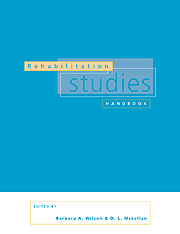Book contents
- Frontmatter
- Contents
- List of contributors
- 1 Introduction to rehabilitation
- 2 Disabled people in society
- 3 Disability equality training
- 4 Towards a therapeutic alliance model of rehabilitation
- 5 Rehabilitation education: a learner-centred approach
- 6 Work, occupation and disability
- 7 Management in rehabilitation
- 8 Research and evaluation in rehabilitation
- 9 Statistical methods
- 10 Social policy, disability and rehabilitation
- 11 Principles of the acquisition of sensorimotor skills
- 12 Management of acquired cognitive disorders
- 13 Challenging behaviour: helping people with severe brain damage
- 14 Pain
- 15 The multiply handicapped child
- 16 The transition to adult life
- 17 Factors specific to disabled elderly people
- Index
10 - Social policy, disability and rehabilitation
Published online by Cambridge University Press: 06 November 2009
- Frontmatter
- Contents
- List of contributors
- 1 Introduction to rehabilitation
- 2 Disabled people in society
- 3 Disability equality training
- 4 Towards a therapeutic alliance model of rehabilitation
- 5 Rehabilitation education: a learner-centred approach
- 6 Work, occupation and disability
- 7 Management in rehabilitation
- 8 Research and evaluation in rehabilitation
- 9 Statistical methods
- 10 Social policy, disability and rehabilitation
- 11 Principles of the acquisition of sensorimotor skills
- 12 Management of acquired cognitive disorders
- 13 Challenging behaviour: helping people with severe brain damage
- 14 Pain
- 15 The multiply handicapped child
- 16 The transition to adult life
- 17 Factors specific to disabled elderly people
- Index
Summary
Introduction: a historical and comparative framework
In most western societies, disabled people, their carers and all who provide treatment in one form or another find themselves faced with a bewildering array of provisions and services. These are likely to include specialised services directed towards people with specific disabling conditions (such as blindness or deafness); through general forms of provision that are restricted to certain social groups (such as older or retired people); to universally available services which benefit disabled people along with everybody else (such as access to free primary health care). The actual content of these various forms of provision will depend on a mixture of historic, social, political and economic influences; these are likely to vary from country to country and over time. The notion that there is a single social policy response to disability, even at one particular time and within the context of a single country, is both in accurate and over simplified. For example, policies towards people with learning disabilities and long-term mental illnesses have on the whole developed separately and been shaped by factors that are different from those which have shaped policies for people with physical disabilities. Policies for older disabled people may be different again (and, comparatively, in their infancy because longevity and hence disability in old age is a phenomenon that has only emerged gradually during this century in industrialised countries).
A single chapter cannot provide a detailed description of social welfare services and benefits for disabled people. Firstly, these will inevitably vary between different countries (and particularly between developed and developing societies); secondly, such a description would rapidly become out of date as new legislation is introduced and implemented.
- Type
- Chapter
- Information
- Rehabilitation Studies Handbook , pp. 205 - 226Publisher: Cambridge University PressPrint publication year: 1997
- 1
- Cited by



